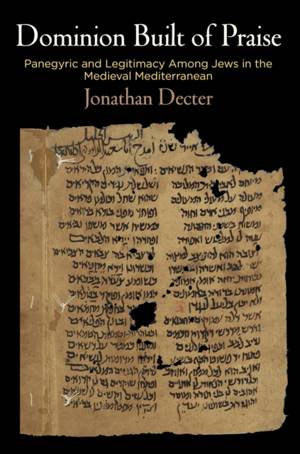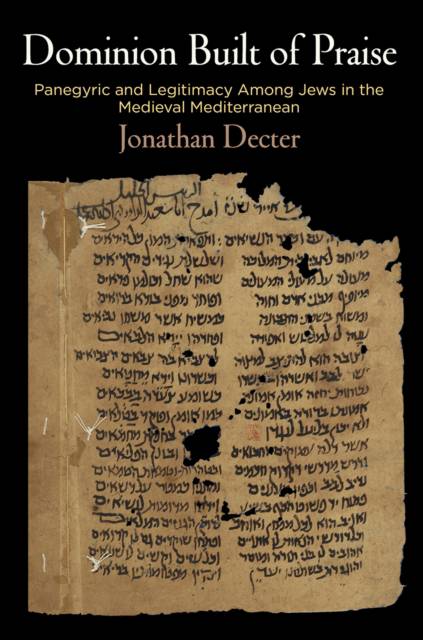
- Retrait gratuit dans votre magasin Club
- 7.000.000 titres dans notre catalogue
- Payer en toute sécurité
- Toujours un magasin près de chez vous
- Retrait gratuit dans votre magasin Club
- 7.000.000 titres dans notre catalogue
- Payer en toute sécurité
- Toujours un magasin près de chez vous
Dominion Built of Praise
Panegyric and Legitimacy Among Jews in the Medieval Mediterranean
Jonathan DecterDescription
A constant feature of Jewish culture in the medieval Mediterranean was the dedication of panegyric texts in Hebrew, Judeo-Arabic, and other languages to men of several ranks: scholars, communal leaders, courtiers, merchants, patrons, and poets. Although the imagery of nature and eroticism in the preludes to these poems is often studied, the substance of what follows is generally neglected, as it is perceived to be repetitive, obsequious, and less aesthetically interesting than other types of poetry from the period. In Dominion Built of Praise, Jonathan Decter demurs. As is the case with visual portraits, panegyrics operate according to a code of cultural norms that tell us at least as much about the society that produced them as the individuals they portray. Looking at the phenomenon of panegyric in Mediterranean Jewish culture from several overlapping perspectives--social, historical, ethical, poetic, political, and theological--he finds that they offer representations of Jewish political leadership as it varied across geographic area and evolved over time.
Decter focuses his analysis primarily on Jewish centers in the Islamic Mediterranean between the tenth and thirteenth centuries and also includes a chapter on Jews in the Christian Mediterranean through the fifteenth century. He examines the hundreds of panegyrics that have survived: some copied repeatedly in luxurious anthologies, others discarded haphazardly in the Cairo Geniza. According to Decter, the poems extolled conventional character traits ascribed to leaders not only diachronically within the Jewish political tradition but also synchronically within Islamic and, to a lesser extent, Christian civilization and political culture. Dominion Built of Praise reveals more than a superficial and functional parallel between Muslim and Jewish forms of statecraft and demonstrates how ideas of Islamic political legitimacy profoundly shaped the ways in which Jews conceptualized and portrayed their own leadership.Spécifications
Parties prenantes
- Auteur(s) :
- Editeur:
Contenu
- Nombre de pages :
- 400
- Langue:
- Anglais
- Collection :
Caractéristiques
- EAN:
- 9780812250411
- Date de parution :
- 12-10-18
- Format:
- Livre relié
- Format numérique:
- Genaaid
- Dimensions :
- 155 mm x 231 mm
- Poids :
- 771 g







